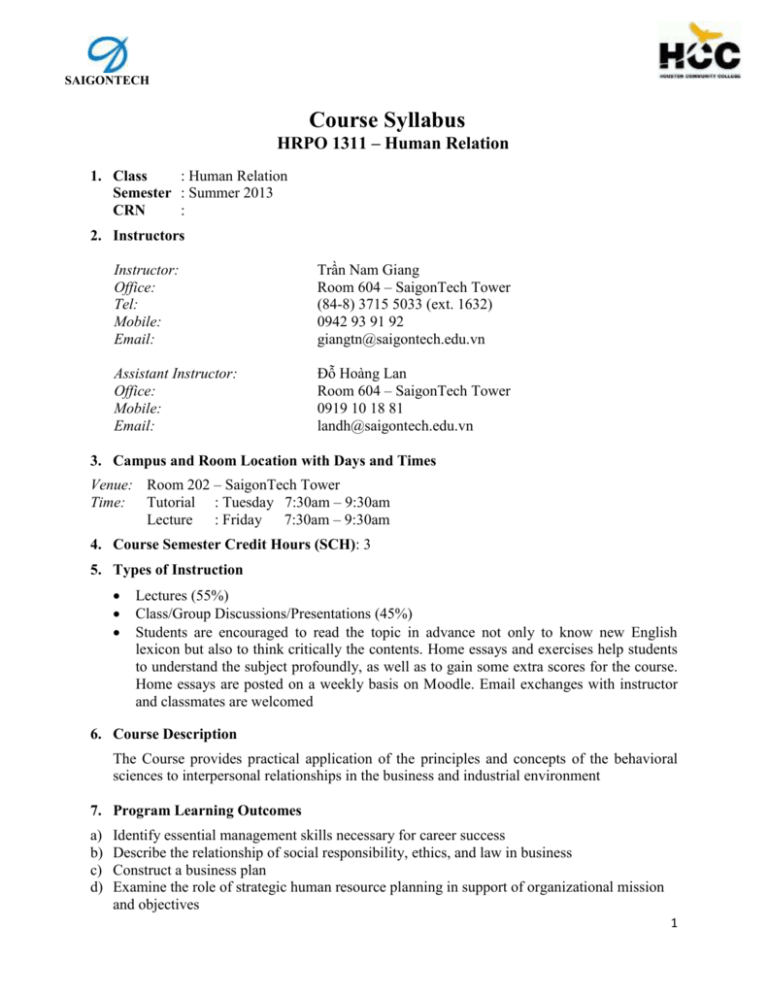
SAIGONTECH
Course Syllabus
HRPO 1311 – Human Relation
1. Class
: Human Relation
Semester : Summer 2013
CRN
:
2. Instructors
Instructor:
Office:
Tel:
Mobile:
Email:
Trần Nam Giang
Room 604 – SaigonTech Tower
(84-8) 3715 5033 (ext. 1632)
0942 93 91 92
giangtn@saigontech.edu.vn
Assistant Instructor:
Office:
Mobile:
Email:
Đỗ Hoàng Lan
Room 604 – SaigonTech Tower
0919 10 18 81
landh@saigontech.edu.vn
3. Campus and Room Location with Days and Times
Venue: Room 202 – SaigonTech Tower
Time: Tutorial : Tuesday 7:30am – 9:30am
Lecture : Friday 7:30am – 9:30am
4. Course Semester Credit Hours (SCH): 3
5. Types of Instruction
Lectures (55%)
Class/Group Discussions/Presentations (45%)
Students are encouraged to read the topic in advance not only to know new English
lexicon but also to think critically the contents. Home essays and exercises help students
to understand the subject profoundly, as well as to gain some extra scores for the course.
Home essays are posted on a weekly basis on Moodle. Email exchanges with instructor
and classmates are welcomed
6. Course Description
The Course provides practical application of the principles and concepts of the behavioral
sciences to interpersonal relationships in the business and industrial environment
7. Program Learning Outcomes
a)
b)
c)
d)
Identify essential management skills necessary for career success
Describe the relationship of social responsibility, ethics, and law in business
Construct a business plan
Examine the role of strategic human resource planning in support of organizational mission
and objectives
1
e) Describe the impact of corporate culture and atmosphere on employee
8. Course Student Learning Outcomes (SLOs): After the course, students are expected to be
able to
SLOs
1. Evaluate human
relations including
diversity, attitudes,
self-esteem, &
interpersonal skills to
promote career
success
Course Objectives
1.1. Describe the nature, development and consequences of self esteem
(chapter 2)
1.2. Describe the importance of self - confidence and self - efficacy
(chapter 2)
1.3. Explain how emotional intelligence contributes to effective human
relations (chapter 4)
1.4. Understand components of attitudes, how they are acquired and
changed (chapter 4)
1.5. Understand the nature of values and how they are learnt (chapter 5)
1.6. Pinpoint the nature of value clarification and how the meshing of
individual and organizational values is important (chapter 5)
1.7. Tactics to develop a good relationship with your manager or team
leader (chapter 9)
1.8. Describe methods of getting along with coworkers (chapter 9)
1.9. Choose an effective method of resolving conflict (chapter 10)
2. Identify and
evaluate the causes
and effects of stress
in the workplace
2.1. Identify several positive and negative consequences of stress (chapter
17)
2.2. Describe methods for managing the potential adverse effects of stress
(chapter 17)
2.3. Describe techniques for improving cross - cultural relations (chapter
13)
3. Develop individual
and group
communication,
listening, and
decision making
skills.
3.1. Explain the basic communication process (chapter 7)
4. Analyze how
theories of
motivation & human
behavior impact
strategies of change
management
4.1. Understand how studying human relations will help you at work and
in personal life (chapter 1)
3.2. Identify roadblocks to communication (chapter 7)
3.3. Describe formal and informal channels of communication within
organizations (chapter 8)
3.4. Apply the problem solving and decision making steps to complex
problem (chapter 6)
4.2. Understand the timeline and development of the human relations
movement plus the major concepts in human relations today (chapter 13)
4.3. Explain how needs and motives influence motivation (chapter 3)
2
4.4. Describe several specific techniques of self – motivation (chapter 3)
4.5. Recognize the contribution of two classical motivation theories to
understand work motivation (chapter 12)
4.6. Describe strategies and tactics for developing teamwork (chapter 12)
4.7. Describe various ways of improving your creativity (chapter 6)
4.8. Explain how perception influences behaviors (chapter 15)
4.9. Develop attitudes, values, skills and techniques that help you become
more productive (chapter 16)
9. Textbook
Human Relations for Career and Personal Success, Andrew J.Dubrin, Pearson Prentice Hall, 2011
10. Course Policies
Home Essays Extension Policy
The home essays must be submitted on or before the due dates. Submissions made on time will
be graded and promptly returned approximately one week after the due date. An automatic
extension of up to four (3) days after the due date is permitted. But there is a compromise which
you will accept by making use of the 3-day extension period:
After 3-day extension, the students have to submit their answers (either soft copies for
Power Point form or hard copies for Microsoft Word form) to the assistant instructor
during working hours on Friday
Submissions using the 3-day extension period will be marked out of 80 instead of 100
Submissions during the 3-day extension period will be marked at the convenience of the
instructor or assistant instructor. This means that students using the 3-day extension
might not receive their result and feedback until the next assessable task.
The feedback on submissions during the 3-day extension period might be less extensive
than submissions on or before the due date. This feedback might consist of a mark and a
short statement about the submission.
Submissions without an approved extension received more than 3 days after the due date
and time will be given a mark of zero (0). No feedback on such submissions will be
given.
Please note that this 3-day extension policy is applicable only to this class
Make-up policy
Students are expected to take exam on the scheduled dates. Makeup test is not allowed
If any class session is canceled, the instructor will discuss with students to arrange a
make-up class
3
Classroom policy
Please be seated before lecture begins, and don't leave early without prior permission
since it is very distracting to your classmates. Arriving late or leaving early without a
valid excuse will count as half of an absence
Because it is distracting to other students and to the instructor, you should keep mobile
phones off/silent, and not carry on private conversations
Being active in class discussions and asking questions are highly encouraged
Do NOT study for another exam, or do work for another class, or play games, or surf
Internet. If you are caught red-handed, you will be dismissed from the class and your
attendance for that class will be ABSENT
Do not close your books or rustle your papers to signal the end of class. Pack up only
when the instructor says he/she has done
Attendance and Withdrawal Policies
Please read information about attendance and withdrawal policies on SaigonTech
website:
http://www.saigontech.edu.vn/saigontech/english/general_academic.jsp?subid=37#6
Academic Honesty
Students are responsible for conducting themselves with honor and integrity in fulfilling
course requirements. Penalties and/or disciplinary proceedings may be initiated by
SaigonTech officials against a student accused of scholastic dishonesty. Please visit this
site for more details about Academic Dishonesty Policy:
http://www.saigontech.edu.vn/saigontech/english/student_discipline.jsp?disID=3&subid=
42
11. Grading Scheme
Course Grading
1) Home Essays
2) Presentations & Discussion
3) Mid-term Exam
4) Final Exam
5) Participation
15%
15%
30%
30%
10%
Final Grade
A
B
C
D
F (Fail)
Final Score
90 - 100
80 - 89
70 - 79
60 - 69
0 - 59
a) Home Essays (individual)
The topics for the home essays will be posted on a weekly basis on Moodle
Mark of 0 will be given for those students who copy the work from other students
The home essays will be submitted from the first tutorial onwards. The results and
feedbacks will be received at the next tutorial
There are 10 home essays in total, but only 8 essays that have highest scores are
taken to calculate your result
Home essays will be done in either Power Point form or Microsoft Word form
depending on the weekly topics
The students submit the soft copies for Power Point form and the hard copies for
Microsoft Word form
4
Below is the list of home essays marking criteria:
Criteria
Written English
Format
Content
Total
Standards
Correct grammar with minor spelling mistakes
Clear and logical lay out
Quality of the content presented, quality of the answers
%
15
15
70
100
b) Presentations (group)
Assigned presentation is accepted only on the due dates specified by the assistant
instructor. Modification of topic or date of presentation is not allowed
Each group (max of 4 people) is required to do 1 presentation for the whole semester.
Each presentation will last 30 minutes (including questions and answers). The groups
have to hand in both hard-copy and soft copy of their power point slides to the assistant
instructor on the presentation day
Everyone in the group has to present. Those who do not present with the group at the
presentation date will receive only 50% of the mark given to the group
The presentations will start at week 2 tutorial
There is no extension approval for group presentation
Below is the list of presentation marking criteria:
Criteria
Speaking speed
Attire
Time management
Power point slides
Pronunciation
Professional
Manner
Content
Total
Standards
Not too fast, not too slow
Appropriate
30 minutes for presentation
( including questions & answers section)
Good design & layout
Accurate, clear, loud enough
Proper gesture, face expression, eye contact, audience
control
Quality of the content presented, quality of the answers
%
5
5
5
5
20
30
30
100
c) Examination Format
Exam
Midterm
Endterm
Type
MCT
Essay
MCT
Essay
Open/Close
Closed
Open
Closed
Open
No. of questions/Duration
30/40 mins
2/75 mins
30/40 mins
2/75 mins
Points
30
70
30
70
Chapters
2, 3, 4, 6, 7
& 10
11, 13, 15,
16 & 17
d) Participation (individual)
Participation mark depends on your diligence and activeness
The students will receive 5% for full attendance and 5% for their participation in
class/group discussions
5
12. Course Calendar (Schedule could be modified by instructor according to course progress)
Week
1
Date
Tue 11/06/13
Fri 21/06/13
Topic
Introduction to course
Chapter 2: Self - Esteem and Self - Confidence
Discussion: Chapter 2
Presentation & Discussion: Motivating Others and Developing
Teamwork (Chapter 12)
Chapter 3: Self - Motivation and Goal Setting
2
Fri 14/06/13
Tue 18/06/13
Tue 25/06/13
Fri 28/06/13
Tue 02/07/13
Discussion: Chapter 3
Chapter 4: Emotional Intelligence, Attitudes and Happiness
Chapter 6: Problem Solving and Creativity
6
Fri 05/07/13
Tue 09/07/13
Fri12/07/13
Tue 16/07/13
7
Fri 19/07/13
Tue 23/07/13
8
Fri 26/07/13
Tue 30/07/13
Chapter 10: Managing conflict
Discussion: Chapters 4, 6 & 10
Chapter 7: Personal Communication Effectiveness
Discussion: Chapter 7
Revision for Mid-term examination
Mid-term Examination
Presentation & Discussion: Communication in the Workplace
(Chapter 8)
Chapter 11: Becoming an Effective Leader
Discussion: Chapter 11
Presentation & Discussion: Getting Along with Your Managers,
Coworkers and Customers (Chapter 9)
Chapter 13: Diversify and Cross – Cultural Competence
Discussion: Chapter 13
Chapter 15: Learning Strategies, Perception and Life Span Changes
Discussion: Chapter 15
Presentation & Discussion: Getting Ahead in Your Career (Chapter
14)
Chapter 16: Developing Good Work Habits
Discussion: Chapter 16
Chapter 17: Managing Stress and Personal Problems
Discussion: Chapter 17
Revision for Final examination
Final Examination
3
4
5
9
10
11
12
Fri 02/08/13
Tue 06/08/13
Fri 09/08/13
Tue 13/08/13
Fri 16/08/13
Tue 20/08/13
Fri 23/08/13
Tue 27/08/13
Fri 30/08/13
6






